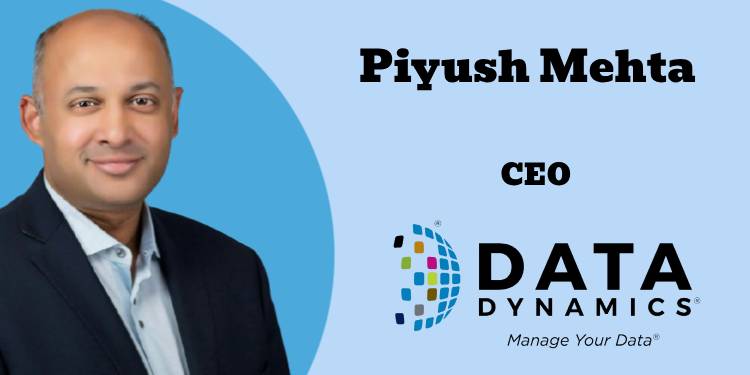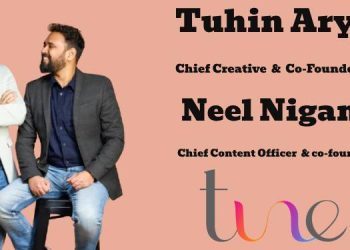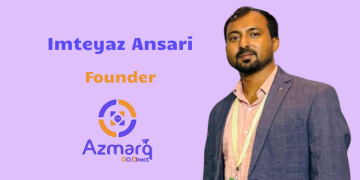Data Dynamics offers enterprise data management, standing at the forefront of the industry-wide shift towards Digital Trust and Data Democracy. Trusted by over 300 organisations, including 25% of the Fortune 20, the company is recognised for its commitment to creating a transparent, unified, and empowered data ecosystem.
The flagship AI-powered self-service data management software is focussing on redefining traditional data management by placing data ownership and control directly into the hands of its creators—regardless of their skillset or role—whether managing risk, security, privacy, sovereignty, optimization, or sustainability, while democratizing the ethical and secure use of data. Pioneering an industry-first ‘data democracy by design’ approach using a DIY (Do it Yourself) self-service framework, Zubin empowers everyone across the breadth of an organisation—from the C-suite to data and application owners, to discover, define, act on, transform, and audit data through an intuitive, self-service, low-code interface.
As organisations navigate the challenges of AI and data governance, Data Dynamics is focussing on creating an ecosystem where every individual becomes a champion of ethical data use and every organisation fulfills its responsibility as a trusted data custodian—paving the way for a future of Digital Trust and Data Democracy.
Medianews4u.com caught up with Data Dynamics CEO Piyush Mehta
Q. How does Data Dynamics’ holistic solution help companies understand their unstructured data?
I don’t see unstructured data as an issue, but as one of the greatest opportunities of our time. Yet, enterprises are still not quite sure what to do with it and what value can be derived out of it. We at Data Dynamics feel that unstructured data is a potential waiting to be tapped—if you are equipped with the right tools to deal with it. We make the data manageable, secured and optimised across different systems while assuring compliance. Zubin, our AI-powered software, guides organisations toward full visibility into unstructured data and combines intelligent analytics automated workflow, role-based access, and rule-based governance through which you can see where the data is, who’s using it, and how it fits into your operation. This kind of clarity allows organisations to make the right decisions in matters of risk, security, privacy, compliance, sovereignty, sustainability and the like.
What makes us different is that we focus on giving control to businesses. Data is most valuable when the people closest to it can manage and act on it directly. That’s why we promote self-service—so teams can take charge, which leads to better efficiency and accountability. When security and compliance are handled upfront, everything else becomes much easier. The secret is in having control, clarity, and the ability to act.
Q. Could you talk about the four pillars that make up the platform – analytics, mobility, security, and compliance?
To us, analytics is about taking raw, unstructured data and making it meaningful with AI-powered contextualisation. These insights help organisations make smarter decisions, enhance data security, and drive innovation. In today’s hybrid and multi-cloud environment, seamless data mobility is essential. Zubin ensures that data moves securely between different environments without losing its quality or context, so teams can access the right information when and where they need it. When it comes to security, protecting data in transit or at rest is no longer enough.
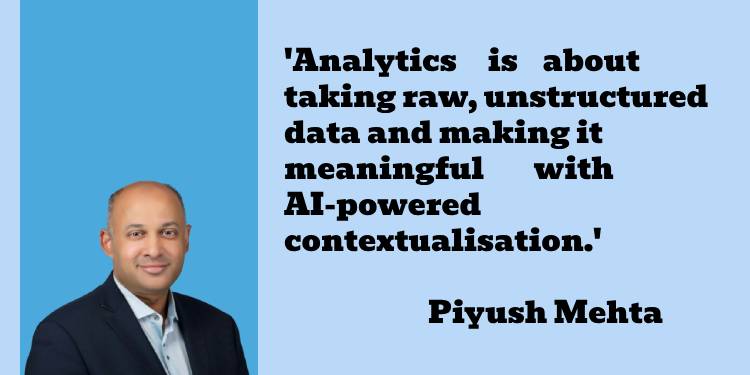
It must be safeguarded throughout its entire lifecycle. With Zubin, we’ve built a multi-layered security framework using AI-driven content analytics, machine learning, and natural language processing (NLP) to identify and classify sensitive business data like PII and PHI. Paired with strong access controls and continuous monitoring, this ensures data remains protected, reducing risks and maintaining integrity. Compliance is also a top priority. As regulations become more complex, Zubin helps organisations stay ahead by ensuring data governance, privacy, and responsible data usage are always in line with the latest legal requirements.
All these elements come together in one unified system that manages data and also empowers businesses to use it effectively—promoting sustainable practices and fostering an ethical, data-driven culture.
Q. What is the gameplan in 2025 to expand the business?
In 2024, the launch of Zubin was a major step forward for us. At the same time, we opened our Centre of Excellence (CoE) in Pune, India, reinforcing our commitment to AI innovation and digital trust. Now as we step into 2025, we’re building on this momentum. We’re expanding into high-growth markets in APAC and the Middle East, while strengthening our presence in the USA, UK, France, Germany, and India.
On the technology front, upcoming releases will offer advanced data governance, privacy-centric compliance, and proactive risk mitigation powered by generative AI. Zubin will introduce data minimization and risk profiling frameworks, enabling organisations to comply with evolving privacy mandates like GDPR and CPRA, while its sensitivity analysis tools will ensure granular compliance across global regulatory landscapes. The software’s expanded integration capabilities will support diverse data environments and pipelines, delivering unprecedented scalability and flexibility.
Q. Does the company spend a lot of time educating clients on data protection?
At Data Dynamics, I’ve always believed that our job isn’t just to deliver solutions—it’s to ensure our clients truly understand the importance of protecting their data. Empowering our customers with the knowledge they need is just as critical as providing them with the best technology. That’s why we built our Training Portal. It’s a key part of how we support our clients’ growth. The portal gives them access to a wide range of resources—everything from easy-to-follow video tutorials to detailed guides—so they can learn at their own pace. It’s simple, intuitive, and flexible, making it easy for teams of all sizes to find the information they need.
We also offer personalised training sessions to address the unique needs of each organisation. Whether it’s getting the basics of data security or mastering more advanced governance techniques, we make sure our clients have the tools they need to succeed. And, as new challenges and regulations come up, our support team is always there to provide guidance and insights.
Q. With the advent of India’s DPDP Act and the global shift towards robust data governance, could you shed light on the new challenges that organisations are navigating to secure, manage, and leverage their data responsibly?
With the introduction of India’s DPDP Act, we are facing a major change in how we manage data. It’s no longer just about securing data. It’s now about building trust through transparency and respecting our customers’ privacy. Yes, there are challenges ahead—especially when it comes to obtaining clear consent and dealing with the complexities of data localisation. But I see this as an opportunity, not a burden.
Obtaining consent is a chance for us to empower our customers, giving them control over their data and ensuring they fully understand how it’s being used. This is more about treating data as something personal, not just a commodity. The data localisation requirement is another challenge we must address, but it’s also an opportunity to innovate. How can we meet these requirements while still ensuring the security and privacy our customers expect? How do we build flexible systems that stay compliant but also agile enough to keep up with business needs?
These are the questions we need to answer if we want to succeed in this new landscape. Consumers today are more aware than ever of their data rights, and they’re demanding transparency. They want to know where their data is stored, how it’s used, and who has access to it. For us it’s about fostering trust, transparency, and responsibility in everything we do.
Q. What is your view of the DPDP Act and how it will help protect individuals’ data rights while fostering trust in the digital economy?
The DPDP Act is a significant step forward in how we think about data privacy. It’s more than just about compliance. It’s about understanding that our customers have new expectations about their personal data. Consumers today are more informed and concerned about where their data goes, how it’s used, and whether they truly have control over it. The DPDP Act responds to this by giving individuals clearer, more informed choices about their data.
This is an opportunity for us to rethink how we engage with our customers. Consent shouldn’t just be a checkbox at the start of the relationship. In reality it should be an ongoing conversation. Data privacy needs to be part of the experience throughout, something we actively manage and respect, every time our customers interact with us.
When we’re transparent and give people real control over their data, we’re showing that we value and trust our customers. This is the strategic move. As data privacy becomes even more important, businesses that lead with trust will be the ones who succeed. The DPDP Act gives us the structure we need, but how we act on it will define how we build customer relationships in a privacy-first world.
Q. How has Data Dynamics integrated AI in the organisation?
Through advanced content analytics, powered by our Data Science Engine, AI/Machine Learning (ML), and Natural Language Processing (NLP), Zubin enables comprehensive content analysis. This allows it to automatically discover and classify sensitive data, including Personally Identifiable Information (PII) and Protected Health Information (PHI). Rather than waiting for issues to arise, Zubin continuously scans for risks and takes immediate action—whether it’s quarantining data or access control or data delete. This proactive, real-time approach is what makes Zubin an essential tool in any data governance strategy.
As we look to 2025 and beyond, we’re expanding Zubin’s capabilities with the integration of generative AI. This advancement will transform how businesses manage and secure their data. With enhanced data governance, privacy-focussed compliance, and proactive risk mitigation, Zubin will help businesses stay ahead of evolving regulations while maintaining streamlined, centralized governance.
Q. What role do AI and cybersecurity play in safeguarding data?
AI in security is more than just about reacting to breaches. It’s about predicting and preventing them before they happen. With technologies like machine learning and deep learning, AI can quickly sift through massive amounts of data in real-time, identifying potential risks and patterns that humans might miss. The more data it processes, the smarter it gets, constantly improving over time.
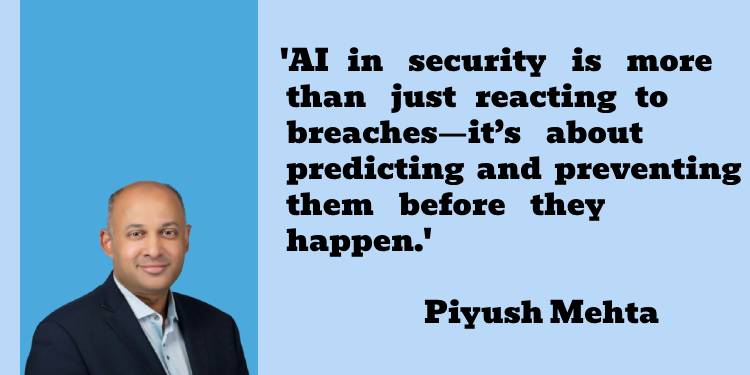
This predictive ability is what makes AI so much more effective than older systems. In industries like finance and healthcare, where the stakes are high and data breaches can have serious consequences, AI-driven security is non-negotiable. It evolves with the data, ensuring businesses can stay ahead of the threats. Without AI in our security strategy, we’re not just risking financial losses—we’re putting our brand, customer trust, and future success on the line.
Q. Could you talk about the strategies that could work to align with new compliance requirements while staying competitive?
I believe the key to staying competitive while aligning with new compliance requirements starts with adopting a consent-based data management strategy. By putting data consent front and center, businesses can ensure transparency and trust with customers while adhering to regulations. This is especially critical in a world where data privacy laws are tightening, and customers are becoming more conscious of how their information is used. Additionally, data residency, data sovereignty, and data localisation will be key.
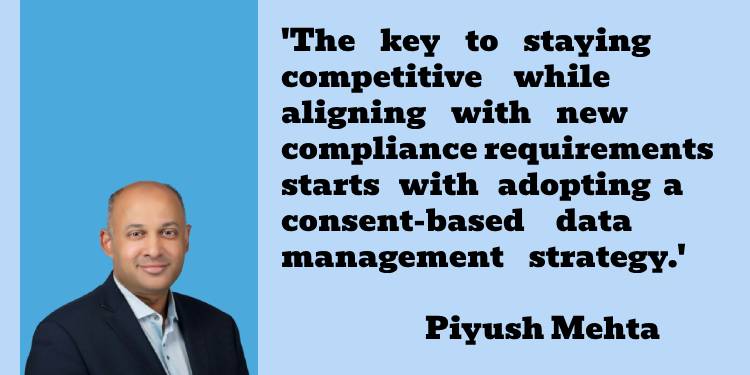
We must recognise where data is stored and processed to ensure compliance with local regulations. All of this becomes easier when the people who create the data are able to manage and act on it. This is where a decentralized approach comes in. By embracing self-service data management, businesses can empower teams to take control of their own data while maintaining strict governance and compliance. It provides the flexibility to meet local data requirements without sacrificing the agility and efficiency needed to stay competitive in an increasingly complex regulatory environment.
Q. In the US there is debate on whether or not Tiktok should be kept alive. There is some concern that it could be used to spy. Your views on social media platforms’ role to safeguard user privacy?
I believe the key issue is how platforms like TikTok earn and maintain user trust. Social media is the modern marketplace for ideas, but with its vast reach comes immense responsibility. Privacy can’t just be an afterthought or a box to check off. Users expect more: they want transparency and control over their data, not vague promises. Platforms like TikTok and Facebook handle vast amounts of personal data, driving powerful algorithms and experiences. But mishandling that data can quickly break the trust of users, regulators, and the public. That’s why we need a proactive approach. Strong encryption, transparent data usage, and giving users control over what they share are key. As companies with global reach navigate different privacy standards, the risks only grow. Industry collaboration with regulators is key to finding a balance between innovation and privacy. Poor data stewardship harms not just users but entire sectors that rely on data integrity.
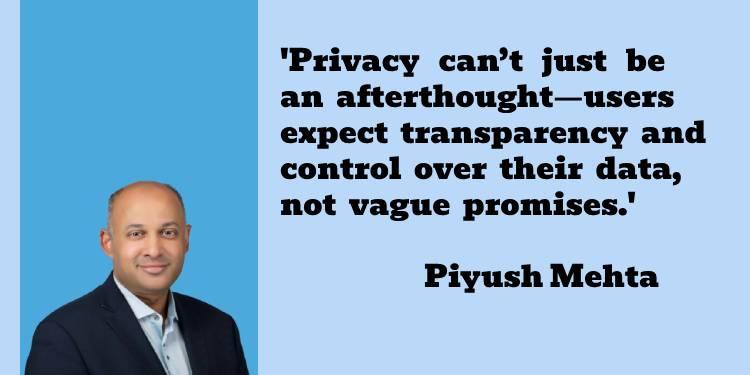
Platforms that prioritise privacy—not just in reaction to external pressure—will win. They’ll earn trust, attract strong partnerships, and set the standard for the future of digital platforms.

